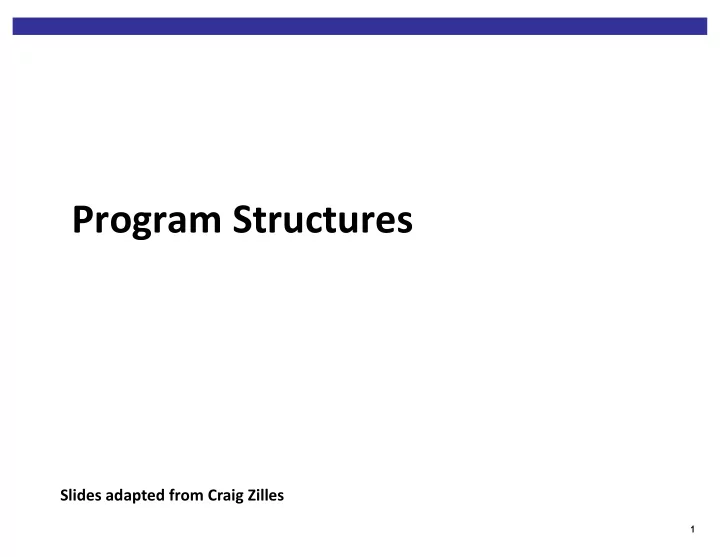

Program Structures Slides adapted from Craig Zilles 1
Unix and Command Line ¢ ls – list files ¢ cat – concatenate files mostly used to output file ¢ cd – change directory § change to home directory if no directory given ¢ pwd – print working directory ¢ mkdir – make directory ¢ mv – move ¢ rm - remove 2
Principles of straight-line code ¢ Make dependences obvious: (e.g., through passing arguments, return values) firstResult = doThing1(); secondResult = doThingY(firstResult); ¢ Vs. doThing1(); doThingY(); 3
Principles of straight-line code, cont. ¢ If no dependences, group related statements § If you were to draw boxes around related statements Good Poor 4 � � � � � � � � ●
Grouping related items (example) ¢ Ordering implicit, but emphasizes grouping MarketingData marketingData = new MarketingData(); marketingData.ComputeQuarterly(); marketingData.ComputeAnnual(); marketingData.Print(); SalesData salesData = new SalesData(); salesData.ComputeQuarterly(); salesData.ComputeAnnual(); salesData.Print(); 5
Which is better? A if (!done) { ... } B if (done == false) { ... } C Control flow is fine for both D Control flow is problematic for both 6
Which is better? A if (!task.isDone()) { task.restart(); } else { toDoList.markCompleted(task); } B if (task.isDone()) { toDoList.markCompleted(task); } else { task.restart(); } C Control flow is fine for both D Control flow is problematic for both 7
Which is best? A if (getAmountOfGasInTank() >= gasNeeded(destination)) { // avoid unnecessary stops; reduce wear on engine } else { fillGasTank(); } if (getAmountOfGasInTank() < gasNeeded(destination)) { B fillGasTank(); } else { // avoid unnecessary stops; reduce wear on engine } if (gasNeeded(destination) < getAmountOfGasInTank()) { // avoid unnecessary stops; reduce wear on engine C } else { fillGasTank(); } if (gasNeeded(destination) >= getAmountOfGasInTank()) { fillGasTank(); D } else { // avoid unnecessary stops; reduce wear on engine } 8
Principles of if/else ¢ write the common case first; then write the unusual cases § More precisely, cover first the case that will reduce the reader’s cognitive load ¢ Encode complex Boolean expressions in methods § Naming documents the meaning of the expression § Even if the method is only called in one place ¢ Use case/switch only when it applies § Don’t do nasty things with it 9
Power of De Morgan’s Theorem the complement of the union of two sets is the same as the intersection of their complements; and the complement of the intersection of two sets is the same as the union of their complements. 10
De Morgan’s Law in practice ¢ Simplify expression to avoid double negatives ¢ Instead of: if (!(printer.hasPower() && !printer.hasPaper())) { ¢ Write: if (!printer.hasPower() || printer.hasPaper()) { 11
Which is better? A public static Map<Integer, Integer> generateHistogram2(int[] data) { Map<Integer, Integer> histogram = new HashMap<Integer, Integer>(); for (int value : data) { int count = 1 + (histogram.containsKey(value) ? histogram.get(value) : 0); histogram.put(value, count); } return histogram; } B public static Map<Integer, Integer> generateHistogram3(int[] data) { Map<Integer, Integer> histogram = new HashMap<Integer, Integer>(); for (int i = 0; i < data.length; i++) { int value = data[i]; int count = 1 + (histogram.containsKey(value) ? histogram.get(value) : 0); histogram.put(value, count); } return histogram; } C Control flow is equivalent for both D Control flow is problematic for both 12
Which is better? A public int[] copyIntArray(int[] input) { int [] copy = new int[input.length]; int i = 0; for (int value: input) { copy[i++] = value; } return copy; } B public int[] copyIntArray(int[] input) { int [] copy = new int[input.length]; for (int i = 0; i < input.length; i++) { copy[i] = input[i]; } return copy; } C Control flow is fine for both D Control flow is problematic for both 13
Which is better? This code takes an array of strings, it processes all of the strings before a A boolean dashFound = false; dash one way and all of the for (String arg : args) { remaining strings another way. if (arg.equals("-")) { Assume there is only one dash in the dashFound = true; } else if (!dashFound) { array of strings. process1(arg); } else { process2(arg); } } B int i = 0; while(i < args.length && !args[i].equals("-")) { process1(args[i]); i++; } i++; // skip the dash for( ; i < args.length ; i++) { process2(args[i]); } C Control flow is fine for both D Control flow is problematic for both 14
Returns ¢ use early returns to reduce nesting, eliminate cases § guard clauses ¢ minimize the number of returns in a routine § all things being equal 15
Gin rummy ¢ Simple 2 player card game using standard card deck ¢ 10 card hands ¢ Meld § Set of cards with the same value (3 or 4 cards) § Set of cards with values in order (3 or more) ¢ Deadwood § Value of all cards in hand not in melds ¢ Play § Take from top of discard or draw then discard § Knock revealing hand to score (dead ¢ Scoring Knock § NonKnocking deadwood – Knocking deadwood 16
Recommend
More recommend